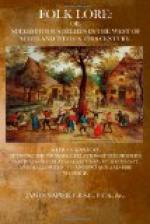CHAPTER II.
BIRTH AND CHILDHOOD.
When writing of fairies I noticed,—but as it is connected with birth, I may here mention it again,—a practice common in some localities of placing in the bed where lay an expectant mother, a piece of cold iron to scare the fairies, and prevent them from spiriting away mother and child to elfland. An instance of this spiriting away at the time of child-bearing is said to have occurred in Arran within these fifty years. It is given by a correspondent in Long Ago:—“There was a woman near Pladda, newly delivered, who was carried away, and on a certain night her wraith stood before her husband telling him that the yearly riding was at hand, and that she, with all the rout, should ride by his house at such an hour, on such a night; that he must await her coming, and throw over her her wedding gown, and so she should be rescued from her tyrants. With that she vanished. And the time came, with the jingling of bridles and the tramping of horses outside the cottage; but this man, feeble-hearted, had summoned his neighbours to bear him company, who held him, and would not suffer him to go out. So there arose a bitter cry and a great clamour, and then all was still; but in the morning, roof and wall were dashed with blood, and the sorrowful wife was no more seen upon earth. This,” says the writer, “is not a tale from an old ballad, it is the narrative of what was told not fifty years ago.”
Immediately after birth, the newly-born child was bathed in salted water, and made to taste of it three times. This, by some, was considered a specific against the influence of the evil eye; but doctors differ, and so among other people and in other localities different specifics were employed. I quote the following from Ross’ Helenore:—




